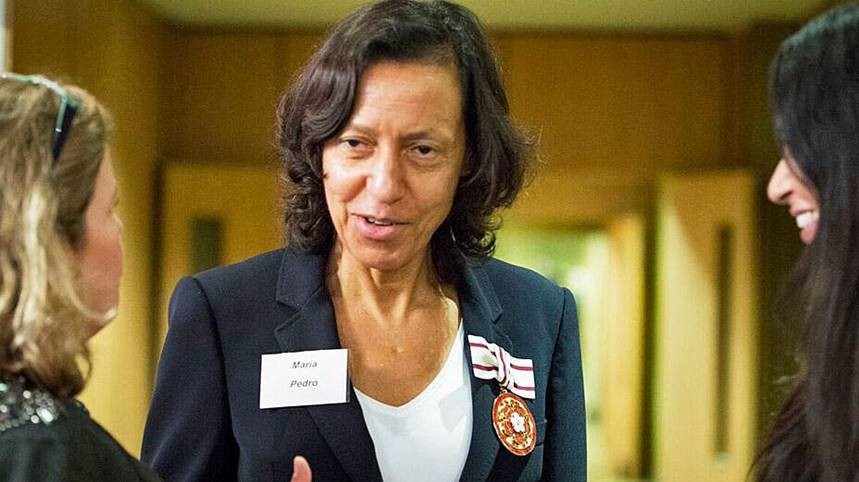MARIA PEDRO OBITUARY
Prostitute’s daughter with attitude who grew up in care but went to the LSE and became a celebrity agent and deputy lieutenant.
Maria Pedro encouraging young people in her role as deputy lieutenant of Hounslow
As deputy lieutenant of Hounslow, Maria Pedro would visit children in care and offer words of encouragement, urging them to dream big. Like her, they could become a merchant banker, a rock star’s business manager, a rugby player’s agent or even the Queen’s representative.
Maria Famlayo Pedro knew of what she spoke, having been abandoned as an infant and raised in care. She was born in Brent, north London, in 1952 of Brazilian, French, British and Nigerian heritage. Her Nigerian father, a pimp, died before she was born. When Maria was 18 months old her mother, a prostitute, left her in the care of Brent social services and disappeared. Although she was a beautiful child and looked rather exotic, Maria was strong-willed and attempts at fostering collapsed.
She attended a local primary school and passed her 11-plus. Social workers urged her to turn down a grammar school place in Ashford, Kent, insisting that she would not fit in. She insisted on going. However, she lacked mentoring and support and as a teenager became a handful.
After a couple of years social services arranged for her to become a boarder at St Catherine’s, an independent school near Guildford in Surrey where she claimed to be the only child of colour and became the school’s leading athlete. She told of completing a 400- metre race, then sitting by the trackside and tackling The Times crossword. School holidays were difficult because, unlike the other girls, she had nowhere to go. Often she would find work serving tea at country houses.
At school she made friends with Jill Moore, the daughter of Lord Moore of Wolvercote, who had been deputy British high commissioner in Singapore and became private secretary to the Queen while Maria was in the sixth form. For a time she lived at Kensington Palace with the Moores, who were the nearest she had to parents.
At the age of 18 she learnt that her mother was still alive. In the early 1990s she hired a private detective, who discovered that her mother was living in a council house in Slough, Berkshire. She discovered a white half-brother who was a “slob”, that her father had been stabbed in a brawl, and that her racist mother had no remorse for having abandoned her. “In retrospect it was a really liberating experience,” she told the Evening Standard in 1993. “I could imagine how I would be and what I would be doing if I’d stayed with her — a miserable existence.”
Although the two women never met again, that revelatory meeting brought an end to 30 years of psychotherapy.
Having sailed through her O and A levels, Pedro won a place at the London School of Economics before running off after a year with a boyfriend to America. When that cooled she returned to complete a BSc in economics and politics, occasionally staying up all night to play bridge. Later she studied for an MBA at Cranfield University, worked for a merchant bank and was briefly married to a wealthy financial consultant whose name is lost to the mists of time.
Her friend Jill went on to marry Peter Gabriel, the singer-songwriter, who convinced Pedro to leave banking and run his burgeoning business empire, including the Real World Records operation. She is credited as a producer on Gabriel’s television documentary Secret World Live and was company secretary of his operations. When the Gabriels divorced she found it impossible to keep working for him, and her friendship with Jill foundered.
At the same time Pedro had been building professional relationships with celebrities from various walks of life. She began to represent the celebrity chefs Raymond Blanc and Michael Caines. On one occasion in Hong Kong she met Jeremy Guscott, who played rugby for Bath. In those days it was an amateur sport and between matches Guscott was working as a bricklayer. She helped him to find work modelling for magazines and making celebrity appearances. Through her association with Bath, she acquired several other player clients, and when the sport turned professional in 1995 she was one of the first to negotiate on behalf of the players.
With Phil Keith-Roach on their wedding day in September
She also met Phil Keith-Roach, a former player. He was involved with the launch of the Rhino Rugby scrum machine, and when the game turned professional he became its first full-time professional scrummaging coach, first at Wasps and then with England. Their relationship started in 1997, but they were only married in September this year. “I should have asked her years ago,” said Keith-Roach. He survives her.
In 2001 Pedro was negotiating a contract with Wasps on behalf of one of her players. However, one day she opened a newspaper to discover that, behind her back, the player had signed for another team. According to Keith-Roach, it was at that point that she lost her appetite for being a sports agent. She joined the National Society for the Prevention of Cruelty to Children (NSPCC) as a celebrity manager, describing her work as “to identify and recruit celebrities to tie up with the charity, get them involved in campaigns and keep them happy”.
Although she enjoyed her work and was especially pleased with the charity’s Full Stop campaign aimed at tackling child cruelty, she was less enamoured with office life and left in 2008. Shortly afterwards, Floella Benjamin (now Baroness Benjamin), the former television presenter who had been one of her celebrities at the NSPCC, invited her to a Woman of the Year lunch.
The event was followed by a meeting with Sir David Brewer, the lord lieutenant of Greater London, and in 2011 she was appointed deputy lieutenant. A year later she became representative deputy lieutenant of Hounslow, where her first event was a speech welcoming home the Welsh Guards from Afghanistan. She and Keith-Roach lived in Maida Vale, west London. Being fastidious to a fault, she invariably left their home far too early for official engagements. “She would wait in the Tesco car park,” recalled Keith-Roach, who added that she continued to enjoy playing bridge.
Pedro’s work introduced her to all walks of life. She visited businesses based on the A4 corridor and encouraged them to apply for the Queen’s Awards for Enterprise; she met and escorted members of the royal family when they visited the borough, took staff from Buckingham Palace into local colleges, and visited schools and children’s homes to talk about her experiences.
She had come a long way from being a ward of Brent social services, but she never forgot that there continue to be plenty of other children who need support and attention.
Maria Pedro, businesswoman and deputy lieutenant of Hounslow, was born on May 22, 1952. She died from cancer on November 4, 2018, aged 66




